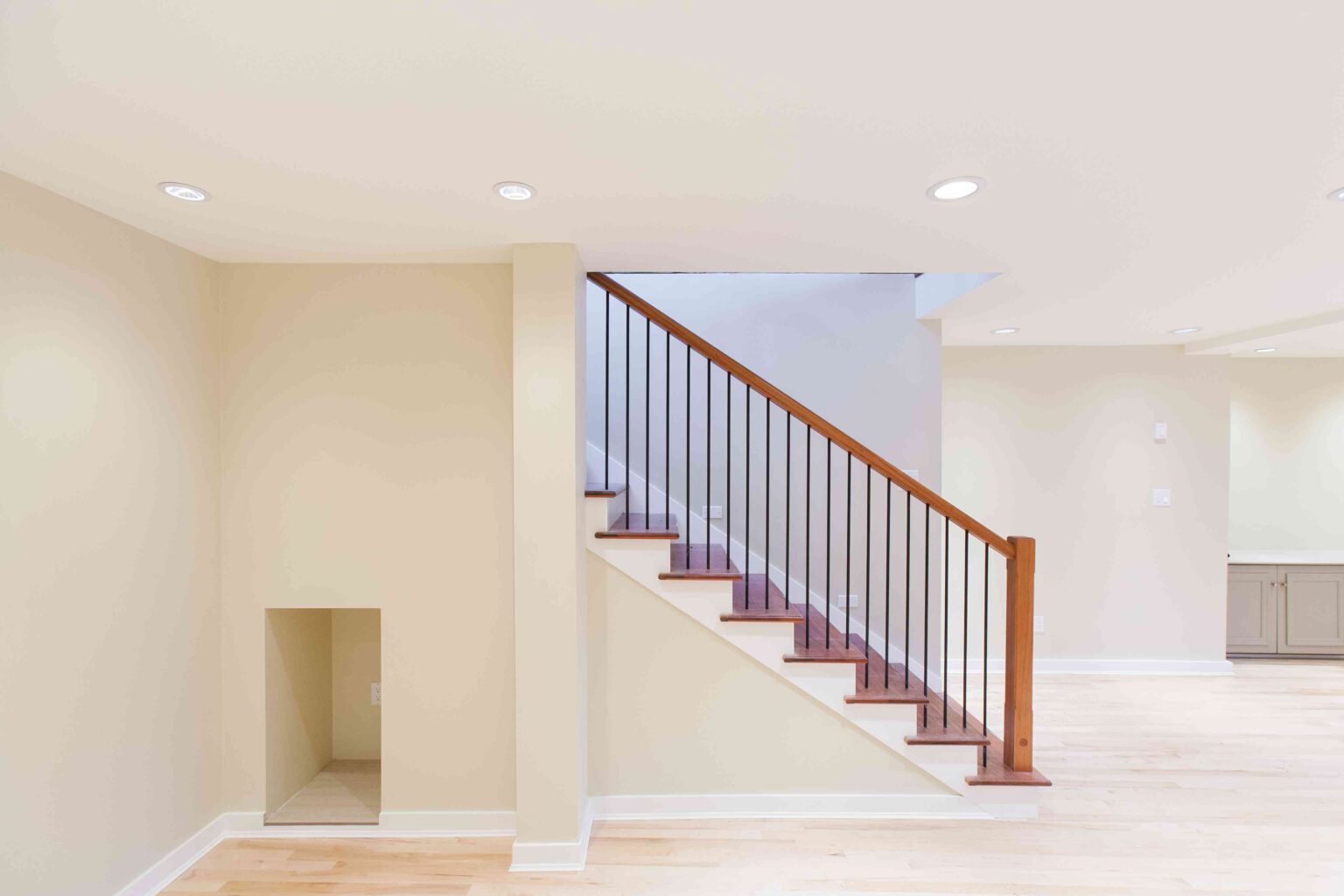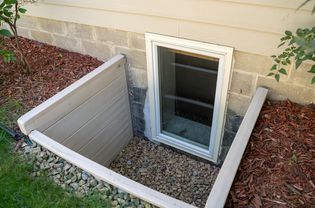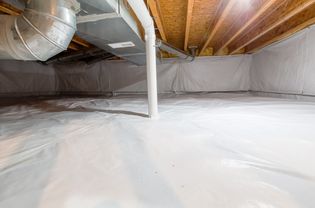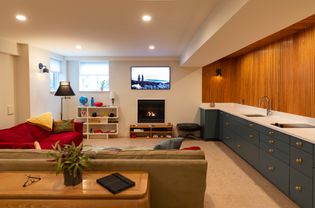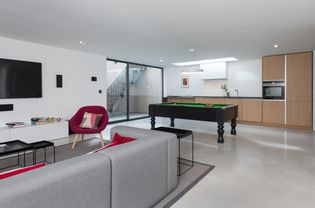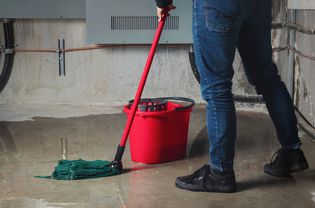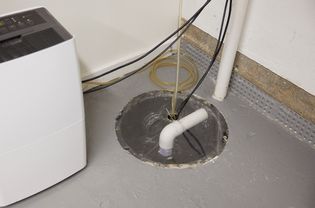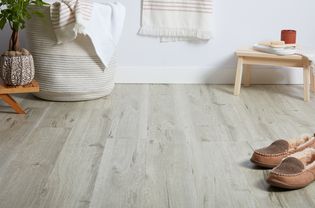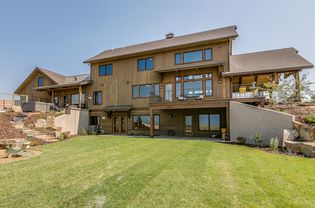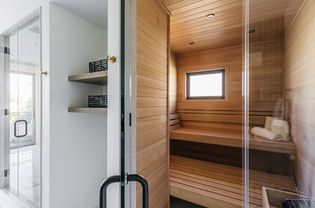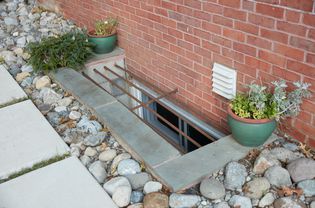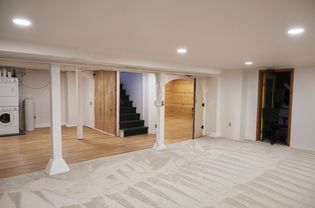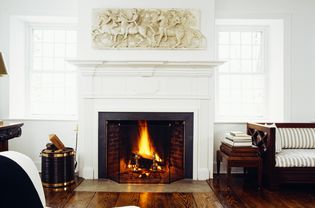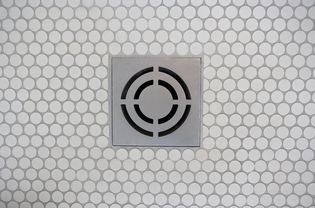Act as an expert content writer specialized in Interior Walls and Ceilings design, who speaks and writes fluently in French. Translate the article below into French. Continue writing until you finish translating the entire content from beginning to the end. Make sure the translation is linguistically accurate, and conveying the meaning, facts and figures of the original text. Make sure the content generated is well written and does not sound like a translation and reflects an awareness of the culture of French people. Don’t talk about Yourself or Your Experience. Don’t Self-reference. Don’t explain what you are doing. Write the content in HTML format and Keep the images and the structure of the article as they originally are. The article to translate:
The cost to finish a basement is between $34,500 and $52,900 for a 2,300-square-foot home.
Finishing a basement adds space for living or entertaining. It’s also a great way to create a fully habitable space for family members or friends or to rent as an income source.
What Is Basement Finishing?
Basement finishing turns an unfinished basement into a climate-controlled, lighted space. With an optional kitchen and bathroom, the finished basement can be used for permanent living.
Average Cost to Finish a Basement
Refinishing a small basement of 1,500 square feet will cost between $22,500 and $34,500, for an average cost of $43,700. The cost of refinishing a large 3,200-square-foot basement can be close to $74,000.
Finishing a basement costs an average of $15 per square foot and can reach a high of $23 per square foot.
| Basement Size | Average Cost | High Cost |
| 1,500 square feet | $22,500 | $34,500 |
| 1,600 square feet | $24,000 | $36,800 |
| 1,700 square feet | $25,500 | $39,100 |
| 1,800 square feet | $27,000 | $41,400 |
| 1,900 square feet | $28,500 | $43,700 |
| 2,000 square feet | $30,000 | $46,000 |
| 2,100 square feet | $31,500 | $48,300 |
| 2,200 square feet | $33,000 | $50,600 |
| 2,300 square feet | $34,500 | $52,900 |
| 2,400 square feet | $36,000 | $55,200 |
| 2,500 square feet | $37,500 | $57,500 |
| 2,600 square feet | $39,000 | $59,800 |
| 2,700 square feet | $40,500 | $62,100 |
| 2,800 square feet | $42,000 | $64,400 |
| 2,900 square feet | $43,500 | $66,700 |
| 3,000 square feet | $45,000 | $69,000 |
| 3,100 square feet | $46,500 | $71,300 |
| 3,200 square feet | $48,000 | $73,600 |
Benefits of Finishing a Basement
Homeowners who want to add value to their property and increase space at a reasonable cost may want to consider finishing their basement.
- More space: Habitable living space for a one-story house is nearly doubled by fully finishing the basement.
- High return value: A basement remodel may return 70-percent of its cost upon sale.
- Greater property value: Increasing a home’s internal square footage increases its intrinsic property value.
- Income potential: A fully finished basement can be rented as an income source.
- Lower cost: Finishing a basement is cheaper than many other options like building an addition.
Finishing Cost by Room
A fully finished basement meant for residency must include a kitchen and a bathroom, along with a living area and bedroom.
Kitchen
A kitchen costs $100 per square foot to $300 per square foot.
A modestly furnished basement kitchenette of 50 square feet may cost around $5,000, while a more substantial, full-service kitchen of 100 square feet may cost around $30,000.
Bathroom
Installing a basement bathroom costs $8,000 to $15,000. On average, you’ll spend about $11,500 to install a bathroom when finishing a basement.
A basement bathroom with a bathtub or shower transforms the finished basement into a habitable space. Creating drainage in a basement can be complicated and costly because the concrete floor must be broken up to install the drain lines.
Permits and Legal Requirements
Permits to finish a basement can cost up to $2,000.
Some municipalities may bundle all subproject permits under one larger basement remodeling or finishing permit.
Other areas may require you to apply for each building permit individually. In this case, it is especially valuable to have a contractor coordinate the permitting and inspection.
Preliminary Costs
Basement Waterproofing
Basement waterproofing costs an average of $5,000, with a price range of $3,000 to $7,000. On average, waterproofing a basement costs $5,500 or around $3 to $10 per square foot.
It’s common for basements to have moisture, whether from major events like flooding or moisture wicking up through concrete floors. Basement moisture must be fixed before basement flooring can be installed.
Basement moisture can be fixed by diverting downspouts from the foundation, sealing the foundation walls with waterproofing paint, installing drain tile, and adding dehumidifiers.
Yard Regrading
Regrading a yard costs from $900 to $4,350, but minor regrading jobs can be done by yourself—for free, with a flat-bladed shovel.
Regrading the yard is an important step in ensuring a dry basement, as this diverts groundwater away from the foundation.
Mold Remediation
Mold remediation in a basement costs an average of $2,360, with a price range of $1,220 to $3,750.
Mold and mildew are frequently found in basements due to the moisture and lack of light. Mold must be remediated and its source addressed before the basement walls are built.
Structural Repairs
The cost of removing a load-bearing wall in a basement during finishing is around $2,120 for interior walls. If exterior walls must be removed to expand the house’s footprint, the average high cost starts at $11,400.
Basements often contain many columns or load-bearing walls as structural supports for the house above. However, impediments like columns and load-bearing walls are not desirable for the finished basement, so they can be replaced with appropriately sized load-bearing beams.
Basement Finishing Costs
Walls and insulation, floors, heating and cooling, and subflooring are a few of the core basement finishing costs.
Build Walls
The cost to build an interior wall in a basement is around $200 per 8-foot-long section of wall, not including insulation.
Visually unappealing items such as drain pipes, wires, electrical conduits, and HVAC ducts are found in basements. It costs about $250 to build a false wall to hide these items.
Add Insulation
Insulating a finished basement costs about $200 per 8-foot-long section of wall.
Though below-grade spaces like basements are largely buffered against temperature spikes and dips, they still need to be insulated.
One method is to apply rigid foam sheets to the basement concrete walls with adhesive and then install drywall on top. Another method is to place rigid foam sheets behind a wood or metal stud wall system.
Install Subflooring
The cost of subflooring for a basement is about $2 per square foot for subfloor panels 3/4-inch-thick on OSB board.
A basement subfloor is a layer that goes above the concrete base floor and below the floor covering (laminate, carpeting, etc.) to control moisture and temperatures.
You have several basement subfloor options ranging from sheets of rigid foam insulation to subfloor panel systems like Dricore or Barricade.
Install Flooring
The best basement floor is made of a hard, inorganic material so that moisture will not damage it. Thin floor coverings like vinyl and tile add more ceiling room to basements with low ceilings. A popular basement flooring choice also happens to be the thinnest: a painted concrete floor.
Floors to use for basements include:
- Sheet vinyl
- Tile square or plank
- Luxury vinyl plank or tile
- Concrete
- Carpeting
- Rubber flooring
Add Heating and Cooling
Heating a basement costs from $100 for an electric space heater to several thousand to install a new central furnace or extend existing ducts.
It’s important to make a basement warmer since it’s always cooler below ground-level. This works to your advantage during the warm months, when basements naturally stay cooler—without the need for artificial cooling methods.
Add Electrical
The cost of an electrical subpanel ranges from $400 to $1,750 for a 100-amp subpanel. It is common to install a subpanel in a finished basement, as the subpanel sections out part of the home’s electrical distribution network and directs it toward the basement only.
If a new 200-amp electrical service panel must be installed to serve both the main house and the basement, the cost will be about $2,500.
Install Windows
Sliding windows cost from $660 to $2,245. Sliding windows are commonly found in finished basements due to the narrow space between the top of the foundation wall and the bottom of the upper floor’s joist.
Glass block windows are also frequently found in finished basements because they are translucent: they let light in but residents can maintain their privacy.
Installing a glass block window costs from $470 to $$1,000. Long runs of glass blocks can cost up to $5,000 to install.
Add an Egress Opening
Local building codes typically adopt provisions of the International Residential Code (IRC) that specify egress (emergency exit) openings for basements:
- At least 5.7 square feet in area
- 44 inches or lower above the basement’s finished floor (or has a ladder, if higher)
- Window well projects horizontally 3 feet or more
- Easily be opened without keys or tools
Paint Walls and Ceiling
Painting a room costs $960 to $2,880 for a medium-sized room (an average of $1,920) and from $1,760 to $5,280 for a larger, 880-square-foot room (an average of $3,520).
Painting the basement yourself is one way to control the cost of finishing it. If you own paint equipment, you can paint each room for around $415.
Add Plumbing
Adding a new toilet costs about $470. To move a toilet a few inches in a finished basement can cost $300 to $600.
To move a toilet several feet can cost $1,000 or more because the concrete floor needs to be jackhammered and broken up to install the new sewer line.
Going the luxury route for a large walk-in shower costs $700 to $14,000.
Additional Costs
Pest Control
Below-grade spaces experience more insect activity than above-grade spaces. Once you finish your basement, you will encounter more spiders, cockroaches, termites, centipedes, pillbugs, and rodents.
Entering into an ongoing contract with a pest control service or taking DIY pest control measures is usually necessary after finishing a basement.
Sump Pump
Unfinished basements often already have sump pumps to keep the basement dry from rising groundwater. If so, the same sump pump can be used, as long as it is still in good working order.
If there is a sump pit but no pump, it will cost about $300 to install the sump pump. If the home has no sump system at all, the cost is around $4,000 to set it up.
Basement vs. Other Finished Living Spaces
Finishing a basement costs between $34,500 and $52,900, which is less expensive than other methods of creating living spaces, such as building an addition or a tiny home on a foot-by-foot basis.
Finished Basement vs. New Home
The average cost to build a house is $520,000, but it can range up to $534,300 for a 2,650-square-foot home.
Finishing a basement is far less expensive than building a new house, especially considering that a new house requires the purchase of land—an average of $115,000 for 0.4 acres.
Finished Basement vs. Addition
On average, building an addition costs $50,000, but high costs can easily reach $150,000 or more.
Finishing a basement costs slightly less than building a small addition. One advantage of finishing a basement over building an addition is that no yard needs to be used; the house’s footprint remains the same.
Finished Basement vs. Sunroom Addition
The cost range for a sunroom is between $20,800 to $72,600, with an average cost of about $46,700.
A sunroom addition is a prefabricated or built-from-scratch addition primarily for relaxing or gardening and meant to be used as a habitable space. It costs about $3,000 more than a finished basement.
Finished Basement vs. Tiny Home
Most tiny houses cost from $30,000 and $60,000, for an average cost of $45,000. This is for a small area of about 225 square feet, costing from $150 per square foot to $400 per square foot.
A tiny house costs about $2,000 to $3,000 less than a finished basement. But on a per-square-foot basis, it is far more expensive than a finished basement.
| Space | Cost |
| Finished basement | $42,700 |
| New house | $520,000 |
| Addition | $50,000 |
| Sunroom addition | $46,700 |
| Tiny house | $45,000 |
Finishing vs. Renovation or Remodel
What’s the difference between basement finishing and basement remodeling or renovation?
- Basement finishing: Basement finishing turns an unfinished space into a finished space, with lighting, HVAC, new flooring, and sometimes bathing and cooking facilities.
- Basement remodeling or renovation: Basement remodeling is sometimes an alternate term for basement finishing. Strictly speaking, though, basement remodeling refers to remodeling a previously finished basement.
DIY vs. Professional Basement Finishing
If you decide to finish your own basement, the starting cost is around $10,000 for a 1,000-square-foot basement. The cost includes stud framing and drywall, insulation, minor plumbing and electrical work, HVAC, one or two windows, painting, and a basic type of flooring like vinyl or tile.
Basement finishing encompasses nearly all house-building trades, many involving experienced, licensed tradespeople such as electricians and plumbers. So, it’s not uncommon for homeowners to have their basement entirely finished under the supervision of a contractor.
Finishing a Basement for Occupancy
Finishing a basement to turn it into an ADU (accessory dwelling unit) is an increasingly popular choice. But this raises the level of scrutiny from local authorities. A few common requirements:
- Building plan reviews
- Zoning reviews
- Building permits
- Inspections
- Certificate of Occupancy
- Business license (for rentals)
Still, to provide more in-fill housing, many cities and counties have eased up on legal restrictions—instituting fast-track permitting, offering pre-approvals for basic plans, removing the owner-occupancy requirement (that owners live on the property), and eliminating off-street parking provisions.
-
Is finishing a basement worth it?
Finishing a basement, while based on individual needs, tends to be worth it, overall. Finished basements return about 70-percent of their value upon sale, and they are less expensive than other ways of adding living space to a home like building an addition.
-
How long does it take to drywall a 1000-square-foot basement?
Drywalling a 1,000-square-foot basement takes a full work week or about five days. Around 30 sheets of drywall or other 8-foot by 4-foot sheets are required.
-
What takes the longest when finishing a basement?
Installing drywall, subflooring, and flooring are three projects that take the longest when finishing a basement.




